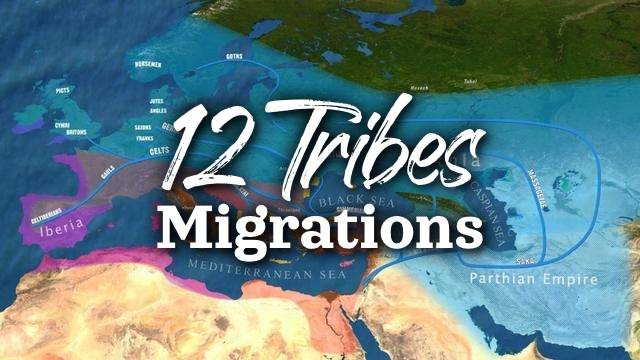Latest Posts
Should we be Baptized?
Baptism - What Does it Mean for us Today?
In our last video we discussed why Christ was baptized: which was in fulfillment of the Levitical Law regarding the preparation of legitimate sacrificial offerings. We also explored why John the Baptist baptized others in addition to Christ, a practice which was in fulfillment of another facet of that same group of laws found in Leviticus, which also required the washing of the priests. John the Baptist’s role in regards to cleansing the sons of Levi was a key prophecy made in relation to him in the book of Malachi.
Understanding the purpose and objectives of the baptism of John, we will now naturally explore the next topic of discussion: what is the context of baptism after the crucifixion? Why did the apostles baptize? Why did they stop? And what does baptism represent in their epistles?
Before we explore these things, let’s first investigate the pragmatic nature of the word baptizo1. During the original times of the apostles, the word did not have the mystical nature that the later so-called churches applied to it. When a word is decidedly transliterated instead of translated, it allows the translator in question to give it a new definition. Transliterating baptism, the church was able to give it a novel and ceremonially esoteric meaning. Much the same was accomplished through the insertion of the word “gentile” into English translations, which is not even transliterated from the Greek manuscripts, because the word is Latin. (It is often inserted into parts of the New Testament where the Greek word ethnos is found)
To understand the word baptizo, we should investigate how it was read and understood by Christians at the time of Christ. In Greek, the meaning of the word is quite literal: immersion. And in the Greek language the word was used often to describe the immersion into many different things, whether it be water, or otherwise.
With that said, we can see this meaning in the context of some translations from the Bible. Such as when Paul told the Corinthians, that their ancestors were immersed with Moses in the Red Sea2. This was not a spiritual metaphor for baptism, but a pragmatic reference to the Corinthian’s ancestors literal immersion through the opened sea. This is because their ancestors were there. Those Corinthians which Paul spoke to were Israel according to the flesh, as he calls them along with the surrounding pagan nations, (also descending from Israel), later in the same chapter3. In significant part, the people of Corinth were Dorian Greeks, descendants of Israelites from Dor in Manasseh, who had long ago along with Phoenicians sailed to Crete4 and then thereafter to Greece. The Spartans were also Dorians, and wrote to the Judeans about their common heritage during the time of the Maccabees.5
Some of the apostles were former students of John the Apostle, but did not necessarily understand the specific reasons why John immersed men in water. John’s reasons were in relation to the Law and Prophets, but an immersion in water was already a common tradition among Greeks6 and other kindred cultures7 at the time, where by them it was viewed as symbolic for new beginnings and cleansing. The apostles respected the tradition which they had seen in John, but were initially unable to divide its special nature from the Greco-Roman context that they were raised in. Having kept the tradition of water immersion, we see in John’s Gospel that the apostles emulated the practice of immersion in the Jordan river, but that Christ Himself did not baptize with them.8
Christ did not immerse anyone with the apostles, as the objectives of water immersion were already accomplished in John through the cleansing of the lamb sacrifice, and of the sons of Levi. Christ explained on several occasions that John immersed with water, but that He Himself was going to immerse with fire and the Holy Spirit. John the Baptist is recorded as agreeing in all four gospels9. Going further, Christ said he had an immersion to be immersed in: His death10. This is because when Christ died on the cross, the children of Israel were washed in, and immersed in His death. Found dead in body, they are also able to in spirit be raised along with Christ’s dead body11.
This is what Paul spoke of in Romans, when he said that those who are immersed are immersed into His death12. This is an immersion which benefited all of Israel, regardless of belief or sacrament. Those Israelites who rejected Christ would fall prey to the temporal judgments of the world, but they were nevertheless sanctified in Christ. Similar to Paul’s remarks concerning immersion in Romans, Peter made a conscious clarification in his first epistle, noting that in regards to immersion he was not speaking of the putting away of the filth of the flesh, but of the demand of a good conscience before Yahweh13. If we are immersed in Christ, through which we are reconciled to Him in the spirit, we are obligated also to walk with Him14. All of Israel is cleansed in His death15.
In the early years of the Acts era, we see that the apostles maintained the tradition of John, an example of this being read when Phillip immersed the Ethiopian eunuch. A short digression concerning that eunuch: many Judeans had lived in Ethiopia during the time, enough that a model temple was built there16. Similarly, this eunuch had access to scriptures at a time when even Greeks would be stoned if they dared enter the temple in Jerusalem17. Being a Judean, he was obligated under the law to present himself at Jerusalem three times a year18.
But it is important to remember one thing when reading accounts found in the book of Acts: that the book of Acts is a record of the transition from the Old to New Covenants. The apostles were not infallible men or demigods, as some may erroneously want to paint them, but students of Christ learning and adapting along the way. The fact that the Book of Acts is a record of learning and understanding for the apostles is established from the very beginning of the account.
In the opening of Acts, we see Luke record that the apostles are expecting Christ to immediately bring forth the Kingdom19. They like many at the time, did not yet understand the requirement for two advents of the Messiah. Here in the same passage, Christ also reminds them of the immersion they are going to proceed to fulfill. He tells them “Iohannes immersed in water, but you shall be immersed in the Holy Spirit after not many days hence”20. Here, Christ is speaking in regards to the Pentecost, which was the first deposit of the Holy Spirit. This is why John explained that while he immersed in water, Christ would immerse with the Holy Spirit, and the apostles were immersed in the Holy Spirit roughly ten days after the ascension. Water baptism was a ritual to be left behind with John, one which the apostles later abandon in Acts, which we will see, but it was a ritual that unfortunately many assemblies did not similarly leave behind.
Throughoutt the book of Acts, we follow the transition of understanding in regards to this immersion of the Holy Spirit, the key moment being found in Peter’s experience with the household of Cornelius. Later, Peter while recounting the experience recalls that it was at this time that “I remembered the saying of the Prince as He spoke: ‘Indeed Iohannes immersed in water, but you shall be immersed in the Holy Spirit.’21 This reference was not to any immersion of water that took place at Cornelius’ household, but to the immersion similar to what the apostles experienced at Pentecost.
This is why Peter recognized it as such this immersion of the Holy Spirit which the apostles experienced at Pentecost was now being experienced by other early Christians, and Christ’s words were finally becoming clear for the apostles. Peter maintained this understanding from this point forward, even to the time of his first epistle, where in the letter he clarifies in reference to immersion that he is not speaking of the putting away of the filth of the flesh.
From this point forward in Acts, immersion is no longer mentioned in relation to water, and this is the most important key to recognize. The apostles followed Peter in this evolution of understanding, and we see that the understanding then spread among other early Apostolic Christians.
Meanwhile, there were others such as Apollos who had not yet evolved their understanding as the others were. Therefore we see in a principle record of this transition, that Priscilla and Aquilla having seen Apollos teaching the immersion of John; “they took him aside and taught him a better way.”. The better way is the same way which Peter had realized in connection to the household of Cornelius. The better way is the way in which Christ had already told them of before His ascension. There is no doubt at all that this explanation was in reference to the fact that John’s immersion was done away with, and that the immersion of the Holy Spirit through the death of Christ was now given to the children of Israel. This better way is the understanding which the apostles had received and were now transmitting to others.
As the apostles began to understand what Christ had meant regarding how He would immerse with the Holy Spirit and not with water, there was not now two separate immersions competing for recognition. The immersion of John, which as we explained in our last video had no use beyond the cleansing of the sacrifice and sons of Levi for Levitical purposes, was now succeeded by and replaced by another more permanent immersion: this immersion being the death of Christ.
This is now the sole relevant immersion from this point forward, and as Paul says there is “one baptism” in Ephesians 4:5, he explains elsewhere in Romans and Corinthians that all of Israel had now been immersed into the sacrificial death of Christ, this being that one immersion. Asides from this, there is no other. It was this death which allowed the children of Israel to be reconciled to Yahweh, through the death of the Husband, the wife was now released from the penalty of adultery and could again access the Husband through spirit.
Paul even attempts to distance himself from water immersion by the time he wrote his first epistle to the Corinthians, no longer seeing it as a relevant ritual.22
Another thing to mention in reference to Paul, is that Luke records in Acts 19 that when Paul returned to Ephesus, he learned that certain students had not heard of the Holy Spirit. Paul was then curious concerning what they were immersed in. This is because there was no other relevant immersion. It seems that no one had come and shown them the better way yet, as Priscillaa and Aquila had done for Apollos.
Shortly thereafter, hearing Paul’s words, these students were immersed in the name of Christ, and the Holy Spirit then came upon them when Paul laid his hands on them. Afterwards they began to prophesy and speak in tongues, just as the Apostles had done at Pentecost. Here they received that one baptism Paul spoke of in Ephesians. (Additionally, these men being in the mountains were indeed in a region lacking accessible water)
There is no Biblical context for anyone past John to baptize with water, and anyone who tries to teach such falls mute. The very idea of immersing proselytes of into a new religion with water was not uncommon at the time of the apostles, and this is why it was an easy rite to lean into for early Christians who had not evolved their understanding. This is also how the Pharisees interpreted John’s baptism, and is why the Pharisees did not ask John what baptism was, as if it was a new invention, but asked who gave him the authority to baptize.
Historians show us that the Pharisees would baptize foreign proselytes, who were afterwards considered Judeans23. Christ in the Gospels condemned them for these unlawful actions24. We of course know that the reason for John’s baptism was in no way related to the objectives of the Pharisees, but was entirely related to the sacrificial rites required for a legitimate offering in Leviticus. But John’s baptism is not the church’s baptism, and the church’s baptism of water is not the immersion of the Holy Spirit which Christ, Paul, Priscilla, Aquilla, Peter and others taught of.
The modern so called “churches” forsake a Biblical understanding, and adopt a Pharisaical philosophy in its stead.
The Assyrians, Egyptians, and even Greeks had similar traditions to the Pharisees, and when the Roman Empire instituted Christianity as its religion, the misunderstood baptism of John was an easy sacrament for them to adopt along with it, but water baptism has no basis in scripture beyond John. As the apostles adapted their understanding, they would agree with Paul their kinsman where he said that “Christ sent me not to immerse, but to announce the good message” Neither should we immerse, but just as Paul did, explain to our brethren that they have been immersed in the death of Christ, being the seed of Israel.
While the act of water immersion is not itself an error, the church has used it as a method to control men, convincing unaware followers that their salvation is somehow tied to sacraments and pomp. Here they succeed at lording over men, as Paul and Peter warned would happen in their epistles, and it is in this which we see the danger, and it is in this where we see the sin. Any man with any so-called “authority” dipping someone into a tub of tap-water does not trump over the immersion which all of Israel had been immersed into two thousand years ago, and doing so they attempt to give themselves an authority which belongs only to Christ. Today, many Christians need to undertake the same transition which the apostles made two thousand years ago.
Apostolic Christianity was persecuted out of existence to make room for a religion palpable to the Roman Empire, but as Christ told His apostles, “Now ye are clean through the word which I have spoken unto you”. If we search the Word as the men of Berea did, we may also understand just how it is that the children of Israel are cleansed in the Word. This is the same immersion into the Word which Paul wrote of in Ephesians, which the assemblies were metaphorically washed in25. Christians must show initiative to discover the truth of scriptures away from the superstitious doctrines of men.
Christianity is not form and sacraments, but substance and action. All of Israel have been washed in the blood of Christ, indeed an element of prophecy26, and just as in Adam all die, all in Christ will be made alive.
If you would like to learn about this topic in more depth than this introductory video, please visit Christogenea, which has a host of essays on the subject.
1#G907
21 Corinthians 10:1-2
31 Corinthians 10:18
4Classical Records of the Dorian & Danaan Israelite-Greeks (William Finck)
51 Maccabees 12:20-30, Antiquities 12.4.10
6Eumenides 448-452
7Ancient Near Eastern Texts Relating to the Old Testament, p. 437 & 495
8John 4:2
9Matt 3:11, Mark 1:18, Luke 3:16, John 1:33
10Luke 12:50
11Romans 6:5
12Romans 6:3
131 Peter 3:21
14Colossians 2:6
151 Corinthians 15:22
16Elephantine papyri
17Temple warning inscription
18Exodus 34:23, Deuteronomy 16:16,
19Acts 1:6
20Acts 1:5
21Acts 11:16
221 Corinthians 1:16-17
23Lightfoot’s volume 2 on pages 55 to 63 in A Commentary on the New Testament
24Mat 23:15
25Ephesians 5:25-27, also John 17:17, 1 Peter 3:21
26Jer. 33:8, Ezek. 37:23, etc








